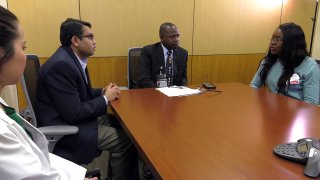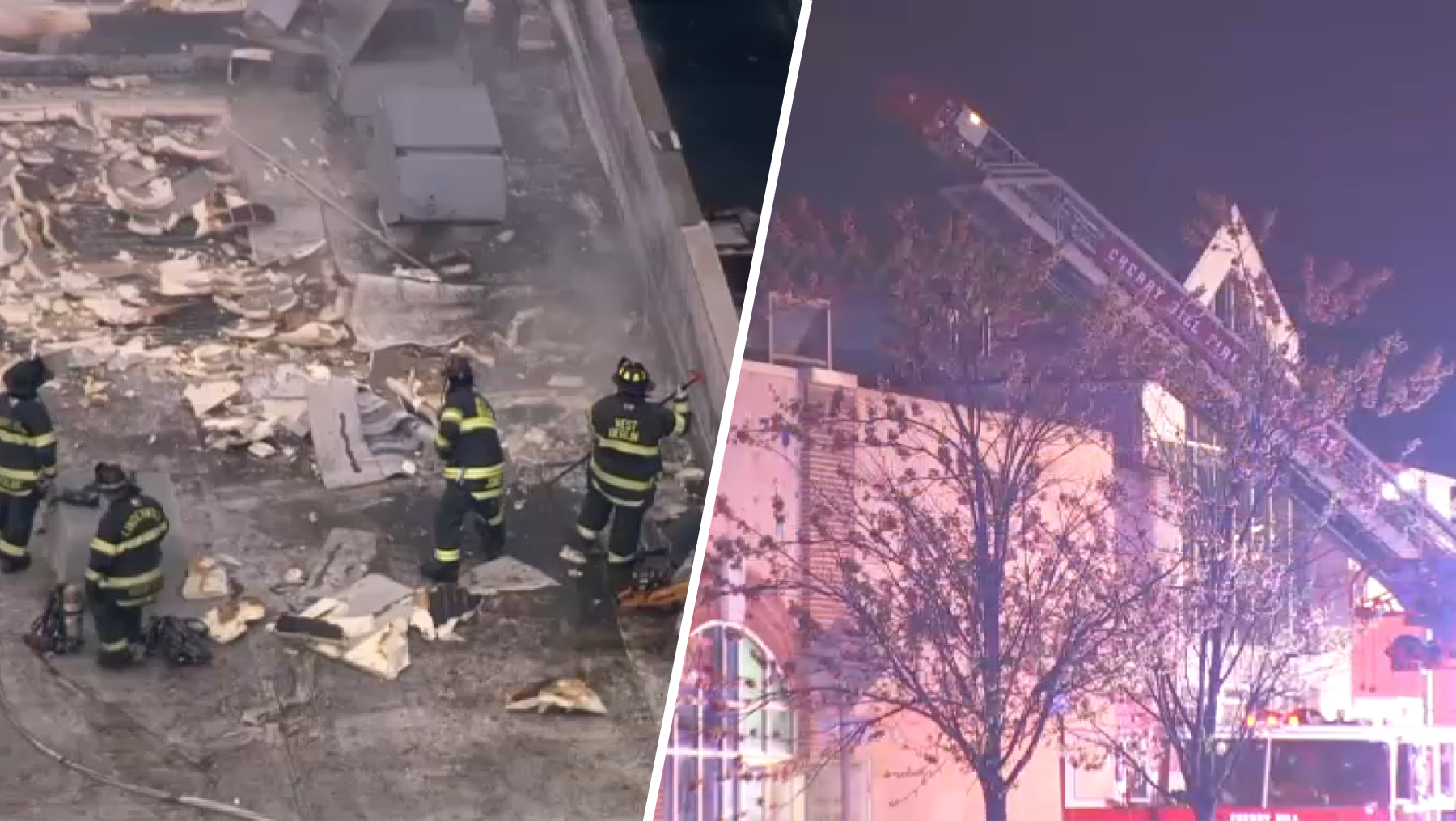
Suicide prevention has been an elusive topic for generations. Even doctors historically shied away from the conversation, assuming psychiatrists and families would step in when the time was right.
But stigma prevents many people from opening up about depression, leading to a deadly silence that, partially, helps to explain why people kill themselves.
[[425359103, 300, 600, L]]
Now, mental health experts are leading a new approach to suicide prevention that asks medical professionals to do the opposite of what has been prescribed: speak frankly with their patients. It’s a core value of the Zero Suicide initiative, which is gaining traction throughout the country.
"Good evening. Today we are here to talk about suicide prevention," said Dr. Inua Momodu, chairman of the department of psychiatry at South Jersey's AtlantiCare Regional Medical Center and medical director at AtlantiCare Behavioral Health.
The small group of psychiatry residents sitting around a polished wood conference table each sat up a little straighter. Suicide prevention is part of their regular training, but few things can prepare even future medical professionals for speaking with patients who want to die.
"Suicide is preventable. There is hope and there is help," Momodu continued.
Local
Breaking news and the stories that matter to your neighborhood.
In order to find that help, doctors must first learn to ask the right questions when a patient visits the hospital or primary care office. This is where the Zero Suicide approach comes into play. It asks all medical professionals — from trauma surgeons to clerical workers — to be able to identify at-risk patients and be prepared to offer them appropriate resources.
The initiative is still in its infancy but already making waves as more healthcare systems learn to ask the simple question: Are you thinking about suicide?
While the approach is simple in theory, it is radical in practice. For generations the prevailing philosophy surrounding suicide went something like this: mention the word and risk planting an idea in someone’s head.
Increasingly experts are dispelling that myth by taking a public health approach to suicide prevention. Rather than encouraging silence, some doctors are now urging people to talk about suicide. This includes doctors who once viewed mental health as the exclusive territory of therapists.
"People need the basic understanding that it’s okay to talk about suicide," said Julie Drew, system executive director of AtlantiCare Behavioral Health. "Asking them is caring. It’s not going to encourage them to [kill themselves]."
AtlantiCare is the only health system in the Philadelphia region that is pursuing a Zero Suicide approach. The Children’s Hospital of Philadelphia has implemented an assessment tool for young patients that mirrors what Zero Suicide recommends for older patients and is working to normalize mental health care in primary care settings, but no other hospitals offer such a comprehensive continuum of care.
At AtlantiCare, every patient who comes through the doors is screened for mental well-being. Direct questions are asked and, if a patient is flagged as high risk, they are referred to a coordinator who creates an individualized plan. This can include inpatient treatment at one of their 30 psychiatric beds and ongoing care outside of the hospital when they are released.
The goal behind Zero Suicide — as the name suggests — is to reduce suicide rates as much as possible. Last year, more than 44,000 people killed themselves in the United States, according to the Centers for Disease Control and Prevention. An estimated 1.1 million Americans are said to have attempted suicide. Experts say those numbers are too high.
[[423701083,C]]
"We know this is a tall order," said Momodu. "We know that we will never have zero suicides, but the fact that we have [this] philosophy makes us work towards that end. We look at suicide as a disease."
The idea behind Zero Suicide started thousands of miles away in Detroit, Michigan, in 2001. Clinicians at the Henry Ford Health System became alarmed after finding that 44 out of every 100,000 people in their region killed themselves in 2000. While that rate was not necessarily higher than in other parts of the country, psychiatrists wondered if they were failing patients.
Prior to 2000, the Henry Ford approach to suicide was largely reactive. If someone signaled they were in distress, doctors scrambled to provide care. But thousands of people remain silent about their depression, so doctors considered a new line of defense.
From this thinking came the Perfect Depression Care model, an early precursor to what eventually became Zero Suicide. At intake, clinicians asked patients how often they felt depressed. If the answer raised concerns, follow-up questions would be asked about diet, sleep, home life and thoughts of hurting oneself. From there patients would be referred to the right doctors.
"Detroit is an auto industry town," said Dr. Cathy Frank, one of the leading psychiatrists at Henry Ford who helped spearhead the initiative. "It’s a zero defects world, but we often don’t think of zero defects in healthcare, at least not then."
For a short time after Perfect Depression Care took off, the hospital system reported zero suicides in its population. Intrigued, the ambitious idea spread to the national medical community and opened the door for more doctors to speak openly about suicide.
At AtlantiCare, all 5,500 employees underwent basic training on how to identify an at-risk patient. Someone who talks about depression or a lack of hope might be easier to spot than someone who is less forthcoming. For those people, Momodu turns to role playing.
The psychiatry residents gathered around his table are put on the spot regularly. They break up into teams with one student pretending to be a patient and another student acting as the doctor.
"Remember, suicide is not always attached to someone who has behavioral or mental health needs," he warned his students before the exercise began. "When we tackle suicide as a disease, we are able to look for it rather than have it embedded inside something else."
As the students separated into pairs, Momodu carefully followed each scenario.
"What brought you in today?" asked second year resident Tapan Parikh.
"Well, you see, I’ve been having some abdominal pain and my husband told me to come in," replied first year resident Dilys Ngu.
From there, Parikh asked about what kind of pain she was experiencing and whether the pain was bad enough to impact her mental well-being. After a few hiccups and several interjections by Momodu, Ngu’s character disclosed that indeed her chronic pain has caused her to consider suicide.
The students have heard it all before. Many of the storylines used in role-playing were born from actual conversations overheard in the emergency department. Someone comes in for sleeplessness and after some coaxing discloses they have lost their job. From there the conversation expands and might eventually lead to hints that the patient is suicidal. But coaxing is key. Without the doctor initiating the discussion, a patient might never open up.
[[423887503, 300, 780, R]]
"Behavioral health issues are frightening to many people even if they are medical professionals," said Dr. Marilouise Venditti, vice president and chief medical officer at AtlantiCare. "But there is always a need for kindness."
It’s too early for AtlantiCare to know how Zero Suicide is impacting their patients. The initiative has been implemented for less than two years and metrics can be hard to measure. AtlantiCare will continue to roll out implementation in stages through the next several years.
Currently, 90 therapists are trained in cognitive therapy and one prevention coordinator liaises between patients and doctors. The days following a psychiatric patient’s release from the hospital are crucial to keeping them alive. They are statistically more likely to attempt suicide again within a day or two of their initial attempt. For this reason, the coordinator keeps in constant contact with these patients and refers them to same-day or next-day treatment.
Every person who treats them is expected to be warm and courteous.
"Body language can say a lot, even in a doctor," Drew said. For this reason, attending physicians must be comfortable talking about suicide openly.
While AtlantiCare is alone in implementing Zero Suicide in New Jersey, several hospitals in other states — including Virginia, Texas, Wisconsin and Colorado — have already committed to the approach. Some use telemedicine to stay in touch with patients who live far from their doctor. Primary care physicians, especially in rural areas where hospitals are spread out, act as a first line of defense.
As more and more clinicians turn to Zero Suicide, a new era of suicide prevention appears to be on the horizon.
"It takes all of us to succeed," said Venditti.
CORRECTION (June 12, 2017, 9:04 a.m.): An earlier version of this article misstated the title of Dr. Inua Momodu. He is chairman of the department of psychiatry at South Jersey's AtlantiCare Regional Medical Center and medical director at AtlantiCare Behavioral Health, not chairman of the department of psychiatry and medical director of behavioral health at South Jersey’s AtlantiCare Regional Medical Center.



